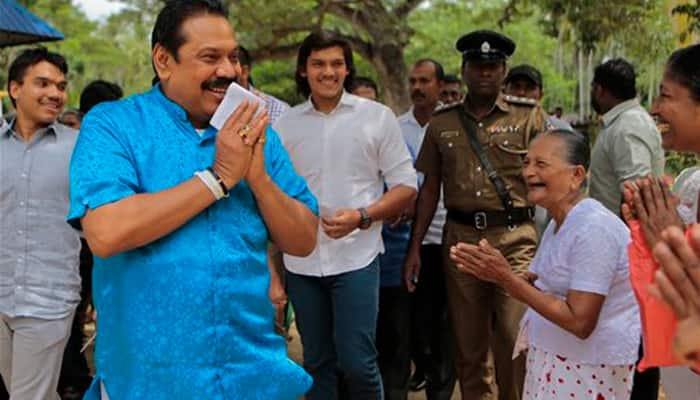Colombo: Sri Lanka`s former strongman Mahinda Rajapakse is confident of pulling off a shock return to power as prime minister, his aide said Monday, in a general election held just months after he was toppled as president.
Big queues formed outside some polling stations as voting began at 7:00 am (0130 GMT) in the election for 225 members of Parliament which was called by President Maithripala Sirisena a year ahead of schedule.
Since his surprise victory over his former mentor in January`s presidential election, Sirisena has struggled to impose his authority over his United People`s Freedom Alliance (UPFA) and was powerless to prevent Rajapakse from standing as one of the party`s candidates.
And although Sirisena has threatened to invoke his executive powers to prevent Rajapakse from becoming prime minister, his combative predecessor is hoping that a strong showing will force the president to back down.
"This election is about whether you want Mahinda Rajapakse as prime minister or not," his spokesman, Rohan Valivita, told a news agency.
"He is 100 percent confident of victory," he said, in an upbeat assessment which is not shared by many analysts who say he could be fighting a losing battle.
Since January, Sri Lankan authorities have pursued Rajapakse and some of his closest relatives, including his wife, on corruption charges.
But he remains hugely popular among big sections of the ethnic majority Sinhalese community for presiding over the crushing defeat of Tamil guerrillas in 2009 after their 37-year campaign for a separate homeland.
Jagath Kumara, a 34-year-old voter in Rajapakse`s home base of Hambantota in the island`s south, said he was convinced the former leader was headed for victory.
"He lost the presidential election in January because a lot of Tamils and Muslims turned out to vote against him," he told AFP.
"But this time the whole Sinhalese community is united in its determination to see Rajapakse elected. More Sinhalese are going to vote today and that means he will win."Rajapakse, a hardline nationalist, has been accused by Sirisena of stirring up ethnic tensions on the campaign trail which could ultimately backfire. Tamils voted en masse for Sirisena in January after boycotting previous elections.
There have been no reliable opinion polls, but most observers predict no single party will win a majority and that 69-year-old Rajapakse -- who ruled Sri Lanka for nearly a decade -- would struggle to form a majority.
Voting got off to a peaceful start, although there were several arrests in different parts of the country for canvassing in violation of Sri Lanka`s election law.
The information ministry warned four television channels, including a state-run network, after they broadcast election-related propaganda material in their broadcasts Monday.
Newspapers were banned from endorsing any candidate on Monday and the privately run Island newspaper said the 15 million potential voters faced an unenviable choice.
"The voters are left with no alternative but to choose the best out of a bad lot and hope for the best," the newspaper said in an editorial.
In the Tamil-dominated northern peninsula of Jaffna, voting got off to a slow start, officials said, noting that local voters usually cast their ballots after midday.
However, officials said there was brisk polling in the central district of Kurunegala, where Rajapakse was standing as a candidate.
Polls close at 4:00 pm and the first results are expected on Tuesday morning.
Although Sirisena is now UPFA leader, his reluctant agreement to Rajapakse`s candidacy highlighted his shaky hold on the party.
His decision to call early elections stemmed from his frustration at the blocking tactics deployed by Rajapakse loyalists in Parliament.
Sirisena is thought to want outgoing premier Ranil Wickremesinghe`s United National Party (UNP) to form the next government with backing from Tamil and Muslim parties.
"People don`t want Rajapakse to come back," Wickremesinghe said at his final press conference before the vote. Rajapakse`s return is "an attempt to resurrect the politically dead," he said.
Sirisena last week vowed not to appoint Rajapakse as premier even if their party won, saying he wanted a younger man for the job.
"If Rajapakse does very well at the election, Sirisena will have no choice but to make Rajapakse his prime minister," political analyst Kusal Perera said. "However, I don`t think the question will arise."
"I think Rajapakse`s comeback effort will leave him as the leader of the opposition at the most."
Rajapakse was shunned by Western governments over the brutal end to the island`s ethnic conflict which prompted calls for international investigators to carry out a war crimes probe.
The UN says that some 40,000 Tamil civilians were killed in the final stages of the war, one of the bloodiest in Asia in the post-colonial era.
















